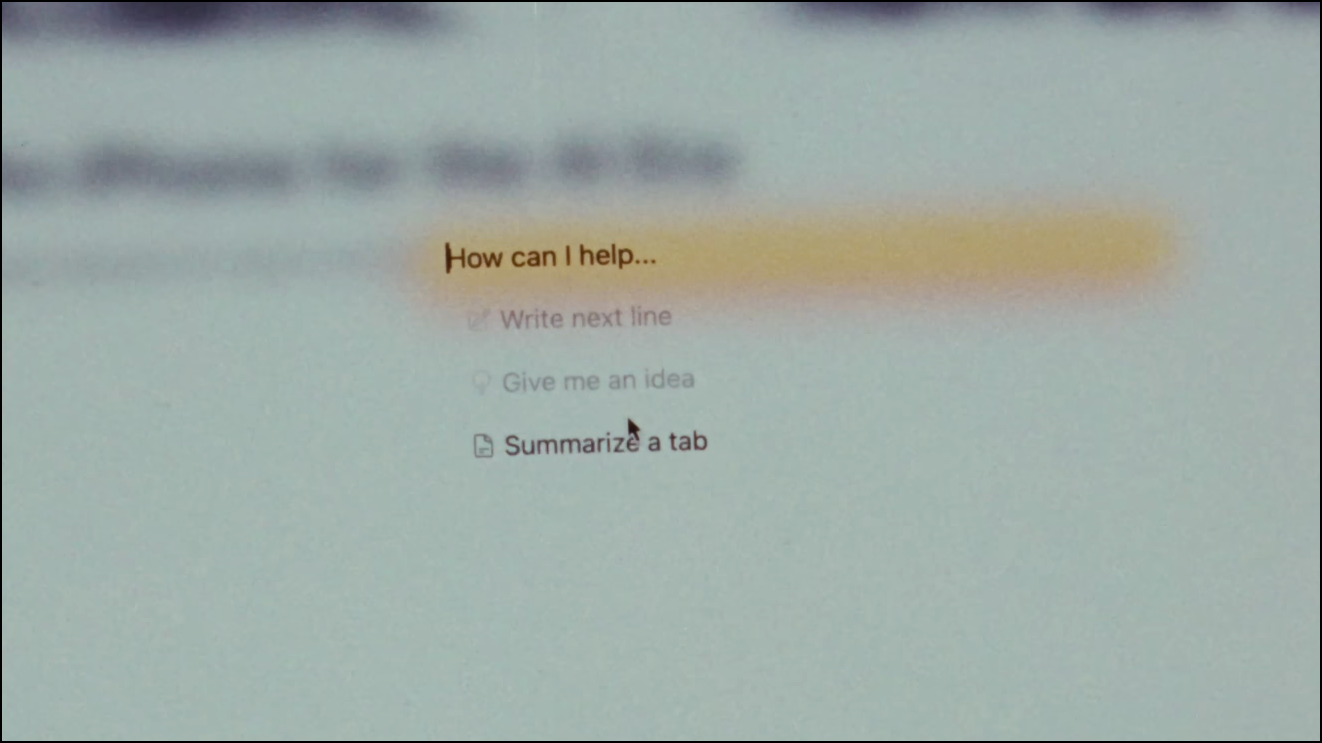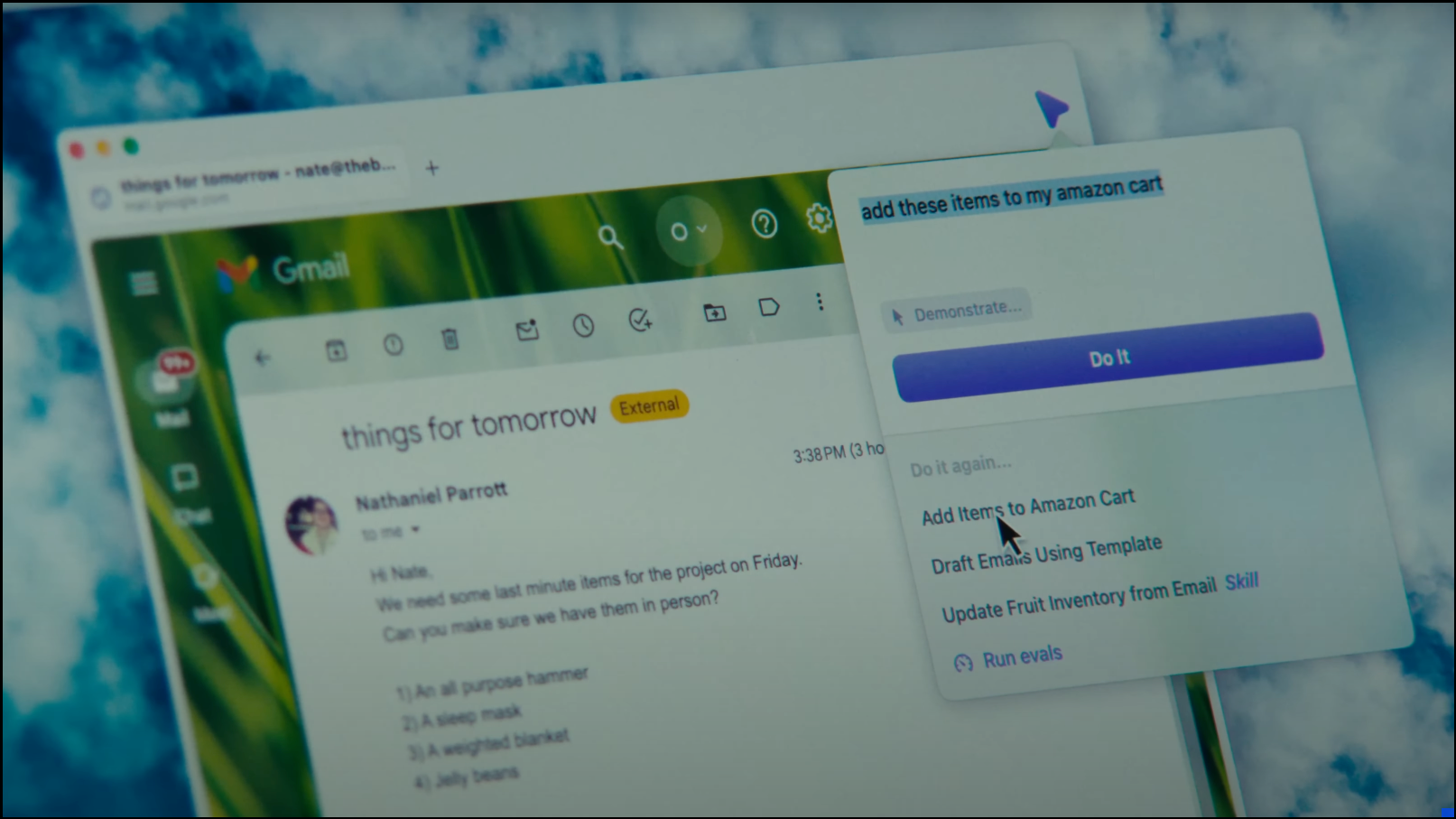Arc Browser, while not a mainstream browser in any right, has amassed a huge niche following of its own. Now, The Browser Company of New York, the company behind Arc, has teased a new browser they're developing – Dia – set for release in early 2025.
Dia is positioned as an AI browser, that'll bring an AI environment to the browser as a whole, instead of the different, scattered features we're used to till now with different LLM models.
The website for Dia reads: "AI won't exist as an app. Or a button. We believe it'll be an entirely new environment – built on top of a web browser."
In a recruitment video, Josh Miller demoed some of the features of the browser that they're currently prototyping.
The video talks about reimagining fundamental computing interfaces with AI in the browser, like the mouse pointer, insertion cursor, and the address bar.
One of the features demoed shows the "reimagined" insertion cursor as an entry point for accessing AI features like 'Write next line', 'Give me an idea', or 'Summarize a tab'.

Some of them aren't that novel as many browsers are implementing an app-wide writing assistant accessible in every textbox. Google Chrome's Help Me Write lets you enlist AI's help to write in any textbox across the browser. The reimagining of the interface in this sense, where the entry point can be accessed by clicking the cursor itself instead of selecting an option from the right-click context menu seems sub-optimal at best.
The "writing buddy" in Dia would also be able to do more than just write. For instance, it can access and enter any Amazon links you have open in the browser in the email it's writing for you.
Another demo involved a reimagined URL bar, which the company previously reimagined in Arc, as the Command Bar. The new interface seems similar to the Command Bar. But it's the "Recall-like" functionality that's new.
Miller says, "your browser has a lot of context about who you are and what you're working on." With the URL bar, Dia (or, Digital Assistant, perhaps?) can access this context about you, or Memory, at any time. For instance, the demo shows Miller asking Dia "What was that doc that Cyrus sent me about Heidegger" and Dia can access the Memory and resurface the exact Notion doc from a Slack chat, even though Miller didn't even remember the name.

If you think it sounds familiar, it's because it does. Memory is evocative of the Recall feature Microsoft introduced (and redacted and reintroduced) with Copilot PCs. Recall attracted a great deal of criticism due to privacy concerns.
In the demo video, Miller mentions that memories are local on your computer and never leave the device.
Previously, the video showed that The Browser Company has been developing ADK (Arc Development Kit) for the past five years which accelerates the development of browsers. They've now built four additional components on top of it: Memory, LLMs, Action, and Self-Driving.
Different features in Dia would use different elements from this layer. For instance, the insertion cursor uses Memory and LLM.
The address bar, however, uses the first three. This means that the address bar can not only dig contextual information for you, it can also take actions on your behalf.
The video goes on to demonstrate this. Once Dia digs up the relevant document, Miller asks it to email it to a co-worker, never once specifying which email service to use.
Dia doesn't need you to specify the email service. Miller explains that since the browser is his environment, it knows the email he uses. Dia knows that Miller is logged into Gmail and uses the app all the time, so it drafts an email in Gmail for the CEO. Similarly, it can whip up a calendar event in the app you use without too many specific instructions.
Lastly, they serve up the demo for the Self-Driving Cursor. Accessible through an icon that looks like the mouse cursor, it lets you automate processes in your browser. In the example, Dia browser goes to Miller's Amazon and adds all the products to his cart that he received in an email list.

In another example, the browser crafts personalized emails for different people according to their call times and locations, which were different for everyone.
Given that the company is named The Browser Company, it's no wonder that they're creating browsers. But their current user base is furious with the company for all but abandoning Arc. Even though Miller said in October that they wouldn't be doing that when he revealed they were working on something new, users do feel abandoned, given the state of Arc on Windows and Arc Search on Android. It'll be an interesting turn of events with the launch of the Dia browser.

